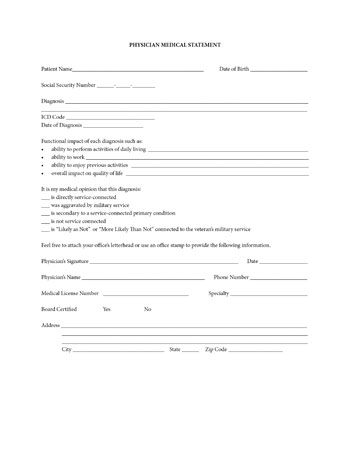VetsHQ has developed a letter that veterans can take to their physician or specialist for assistance in determining whether a service connection exists between your current health condition(s) and your military service.
We recommend one letter per health condition — print as many as needed.
We also encourage you to read through the instructions and the form to understand the evidence requirements of the Department of Veterans Affairs. With a doctor’s assistance in providing credible medical evidence, a veteran can submit a stronger, more viable claim for the benefits they deserve.
The veteran must prove that their injury, illness or disease was either caused by or was aggravated by military service. Examples of how military service can cause or aggravate an injury, illness, or disease include:
- a single event (e.g., plane crash, tank overturned, explosion, bullet wound, bite of infected insect), or
- immediate or long-term exposure to hazards such chemicals, air pollutants, occupational hazards, radiation, or warfare agents, or
- development of mental health conditions, including post-traumatic stress disorder (PTSD) as a result of a traumatic event,
The VA uses a standard of proof in deciding compensation claims in which the veteran is afforded the benefit of the doubt. However, the claim must have competent, credible supporting evidence before the benefit of the doubt standard is applied. The supporting information can be both lay and medical evidence. (38 USC 5107, 38 CFR 3.102, Gilbert v. Derwinski, 1 Vet.App. 49, 1990)
The VA looks for key elements when evaluating the medical evidence submitted with a claim. The evidence may also be reflected in the attached form and copies of relevant medical records. These key elements include:
1. Basis for the physician’s opinion, such as
- theory
- observation
- practice
- clinical testing
- subjective report, and
- conjecture.
2. Physician’s knowledge of the veteran’s accurate medical and relevant personal history.
3. Length of time the physician has treated the veteran.
4. Reason for the physician’s contact with the veteran, such as for treatment, or substantiation of a medical disability claim.
5. Physician’s expertise and experience
6. Degree of specificity of the physician’s opinion
7. Degree of certainty of the physician’s opinion

 Click to download your free Physicians Medical Statement
Click to download your free Physicians Medical Statement